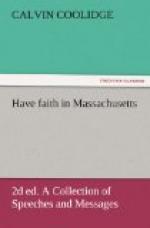In the train of this idea there has come to man a long line of collateral blessings. Freedom has many sides and angles. Human slavery has been swept away. With security of personal rights has come security of property rights. The freedom of the human mind is recognized in the right of free speech and free press. The public schools have made education possible for all, and ignorance a disgrace. A most significant development of respect for man has come to be respect for his occupation. It is not alone for the learned professions that great treasures are now poured out. Technical, trade, and vocational schools for teaching skill in occupations are fostered and nourished, with the same care as colleges and universities for the teaching of sciences and the classics. Democracy not only ennobled man; it has ennobled industry. In political affairs the vote of the humblest has long counted for as much as the vote of the most exalted. We are working towards the day when, in our industrial life, equal honor shall fall to equal endeavor, whether it be exhibited in the office or in the shop.
These are some of the results of that great world movement, which, first exhibiting itself in the Continental Congress of America, carried her arms to victory, through the sacrifice of a seven years’ revolutionary war, and wrote into the Treaty of Paris the recognition of the right of the people to rule: since which days existence on this planet has had a new meaning; a result which, changing the old order of things, putting the race under the control and guidance of new forces, rescued man from every thraldom, but laid on him every duty.
We know that only ignorance and superstition seek to explain events by fate and destiny, yet there is a fascination in such speculations born, perhaps, of human frailty. How happens it that James Otis laid out in 1762 the then almost treasonable proposition that “Kings were made for the good of the people, and not the people for them,” in a pamphlet which was circulated among the Colonists? What school had taught Patrick Henry that national outlook which he expressed in the opening debates of the first Continental Congress when he said, “I am not a Virginian, but an American,” and which hurried him on to the later cry of “Liberty or death?” How was it that the filling of a vacancy sent Thomas Jefferson to the second Continental Congress, there to pen the immortal Declaration we this day celebrate? No other living man could have excelled him in preparation for, or in the execution of, that great task. What circumstance put the young George Washington under the military instruction of a former army officer, and then gave him years of training to lead the Continental forces? What settled Ethan Allen in the wilderness of the Green Mountains ready to strike Ticonderoga? Whence came that power to draft state papers, in a new and unlettered land, which compelled the admiration of the cultured Earl of Chatham? What lengthened out the days of Benjamin Franklin that he might negotiate the Treaty of Paris? What influence sent the miraculous voice of Daniel Webster from the outlying settlements of New Hampshire to rouse the land with his appeal for Liberty and Union? And finally who raised up Lincoln, to lead, to inspire, and to die, that the opening assertion of the Declaration might stand at last fulfilled?




